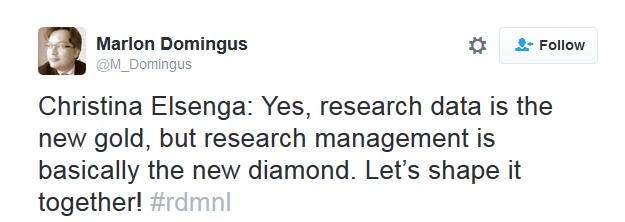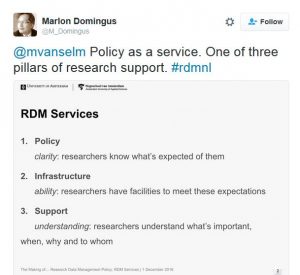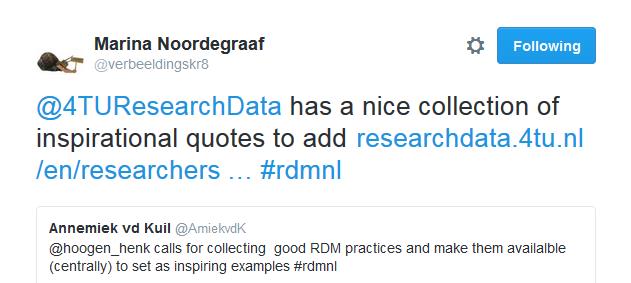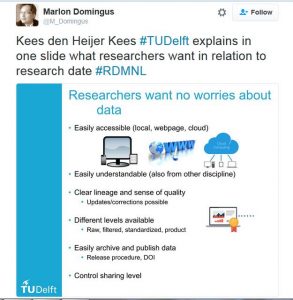10 Tweets on The Making of… Research Data Management Policy
On December 1st 2016 the National Coordination Point Research Data Management (LCRDM) and the working group on research data from UKB (Dutch consortium of the thirteen university libraries and the National Library) organised a seminar about issues in the development of Research Data Management (RDM) policies. There were three sessions: on the current state of RDM policy; on how RDM policy making should respond to the Amsterdam Call for Action on Open Science and the third on incentives and what researchers need. In this blog we share some findings from the day. With a couple of tweets and some of our own observations we give you an impression of the day.
RDM is here to stay
The first message of the seminar, presented by WUR Library director Hubert Krekels, on behalf of prof.dr.Arthur Mol, was that RDM is here to stay. RDM is a must because society asks for it and scientific integrity issues. RDM is possible because the infrastructure, tools and services are available. RDM rewards because it contributes to the scientific reputation of universities and researchers.
Current State
Like WUR, most other Dutch universities are developing RDM Policies. We all seem to work according to the Capability Maturity Model. We find ourselves somewhere between ‘under development’ and ‘standardised and communicated’. RDM policy development is a step by step process, we need to take small steps to get more results and engagement, said Christina Elsinga (RUG).
Funders influence RDM Policies. Should we make a plea to funders for standardized requirements for Research Data Management Planning (DMP)? Jasper van Dijck (TUD) presented a practical overview of the DMP requirements and argued that these are basically standardized enough, given the general bias of the requirements towards FAIR principles.
The influence of the publishers on RDM Policy development, is still relatively low. Only 10% of the publishers demand data availability as a pre-condition for publication. Most journals have a zero policy towards research data. Meaning, no policy at all or data is seen as ‘traditional’ supplementary materials (Fieke Schoots, UL).
The Call for Action on Open Science and FAIR data
In April 2016, the Amsterdam Call for Action on Open Science was presented at the Dutch Presidency Conference. In Mai 2016 the Call was approved by the member states of the EU. The goal for 2020 is twofold. First, full open access for all scientific publications. Second, a fundamentally new approach towards optimal reuse of research data. For the latter, the Call for Action makes a strong case for the application of the FAIR data principles. In the Seminar last week we elaborated in depth what FAIR principles should and could mean for RDM policy, services and tools. Please check the presentations by Peter Doorn (DANS), Mariëtte Selm (UvA), Luiz Bonino (DTL) and Salome Scholtens (RUG), which are available online.
Incentives, hurdles and what researchers want
It is no longer true that researchers live in a private scientific bubble. There is growing awareness that RDM comes with incentives. RDM drives scientific integrity, and with RDM researchers comply to funder requirements. There is the MUST again, earlier presented in the opening of the seminar. This is maybe the stick, but some carrots were also presented. RDM and data sharing leads to collaboration and to new fields of cross-domain research. The intention of the LCRDM working group is to present a proposal on incentives for RDM to the SOV, VSNU in the spring of 2017 (Henk van den Hoogen, MU).
Researchers are just like people, said Kees den Heijer (TUD). They want to focus on research. But also, they want to benefit from data, and they do not want to have worries about data. In the same session Tessa Pronk (UU) presented the hurdles that researchers might experience when they want to share and re-use data. The worries that Kees presented more or less coincide with the hurdles that Tessa presented. So, something to work on!
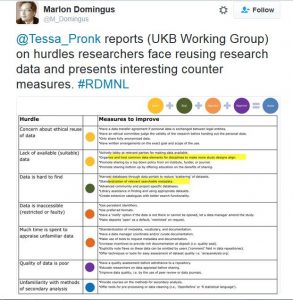
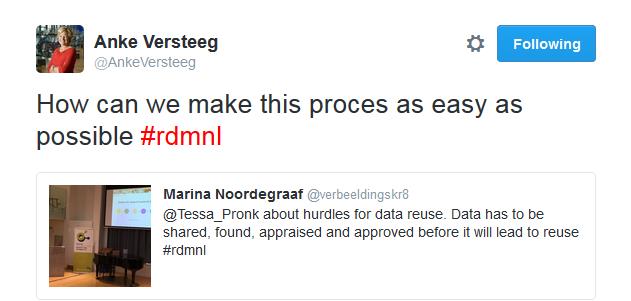
Kees argued that, if a common and understandable framework and infrastructure, tools and services and some flexibility are available, researchers understand that the common (and individual) benefit of Research Data Management can be larger than the burden. As a data publisher there is a contribution to scientific integrity and as a data user there is a benefit in terms of variety of well documented datasets.
So, to conclude, discussing about FAIR data and RDM Policy is needed, but it is not everything. Good services, tools and incentives can contribute to RDM adoption.
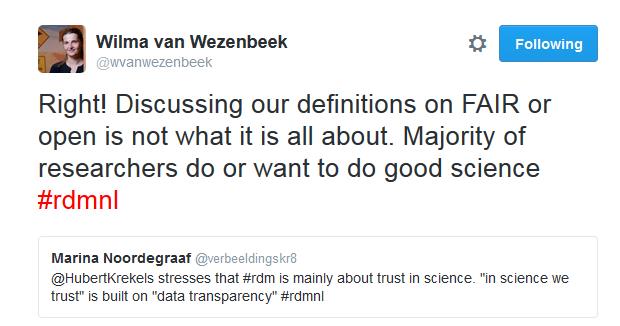
If, after reading this blog, you have questions on how the Data Management Support unit can help you to overcome hurdles, and how you may benefit from RDM, please contact us.
You can find the presentations on the SURF website. All tweets can be found through twitter (#rdmnl).
Thanks to @IAMVerheul for co-organizing the event! Thanks to @EllenFest for bringing the idea and the tweets.


